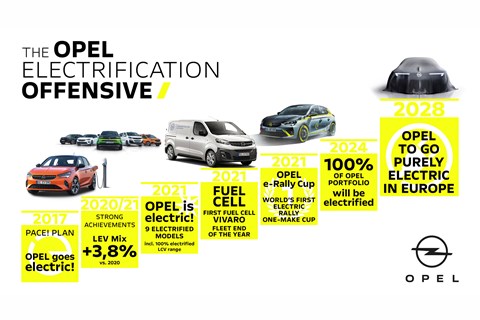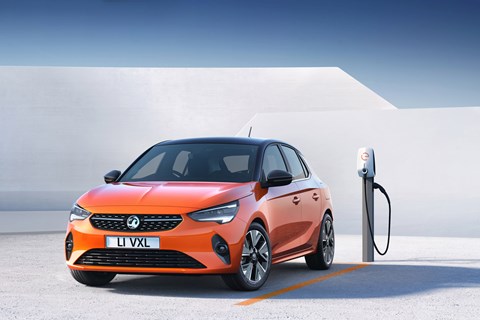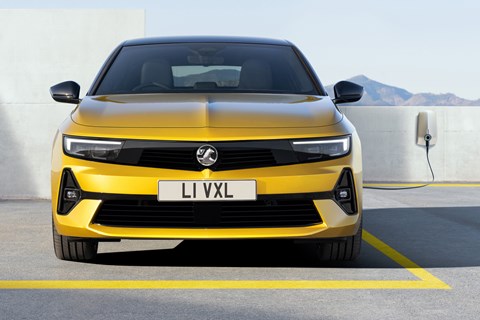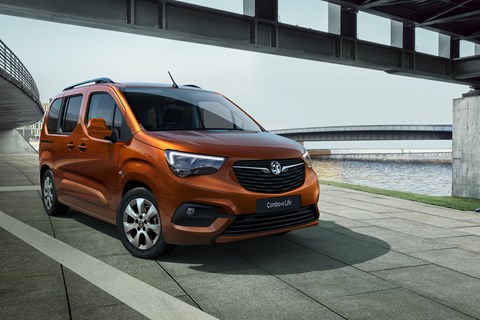► Vauxhall's EV plans explained
► Stellantis saves Ellesmere Port
► And Manta name will be reborn
Vauxhall, and its sister brand Opel, will go all-electric by 2028. The news comes off the back of the Stellantis EV Day conference that outlined how many of the the mega car group's 14 brands would take on electrification over the next decade.
The announcement to go all-electric wasn't long after Stellantis confirmed that the Ellesmere Port plant in north west England would survive in order to make battery-electric commercial vehicles.
Keep reading for the Vauxhall brand's electric plans within the group, including more info on the plans for the Ellesmere Port factory.
Vauxhall all-electric by 2028? Wow...
Indeed. It's part of Stellantis' huge plans to electrifiy all of the 14 brands under its banner, with a set of common electric car platforms rolling out in the years to come. It is, however, just focusing on Europe for this target - not globally.
On top of this goal, Opel confirmed the return of the Manta as a proper production model. Buoyed by the feedback from the Manta GSe electric restomod, the brand will reinvent the Manta as an electric crossover.

Along with this bold plan to go zero-emission within the decade, Vauxhall's sister brand Opel will re-enter the Chinese market. 'We promised that Opel will go global – and we will deliver,' Opel boss, Michael Lohscheller said, adding: 'China is the largest automotive market in the world and we are sure that we will grow profitably there.'
What electrified Vauxhalls are available and planned for the future?
Vauxhall's current model range includes plug-in hybrid models and battery electric ones, too. These have almost entirely been due to its inclusion into the Groupe PSA and then into the Stellantis mega-group, as Vauxhall models shifted onto common platforms used by the likes of Citroen, Peugeot and DS.

The latest Vauxhall Corsa runs on the former-PSA-now-Stellantis CMP platform, allowing for petrol and diesel options and a battery-electric offering. The same can be said for the latest Mokka, with its sharp styling.
Elsewhere, the Vauxhall Grandland uses the EMP-2 platform. Currently, the platform is designed as combustion engine variants and offers a plug-in hybrid, offering more than 300bhp and all-wheel drive. Again, the Grandland shares this platform with cars like the Peugeot 308 and 3008, as well as the new Citroen C5 X, DS 7 Crossback and new DS 9. CAR understands that Stellantis is set to evolve the EMP-2 platform to include a full battery-electric option in the future.
On top of that, Vauxhall is expanding its range of electric vehicles that can be used for both commercial and passenger use. So, basically, vans that can be used for both businesses and large MPVs. Vauxhall currently produces the Combo-e and e-Life passenger version, as well as the Vivaro-e and Movano-e.

As for what else is to come from Vauxhall, the latest Astra – revealed in July 2021 – will also use the EMP-2 platform. A 222bhp plug-in hybrid variant is part of the range from launch, with the first deliveries of the all-new generation arriving in the UK from early 2022.
What's happening at Ellesmere Port?
Long in doubt since the Brexit referendum and subsequent forming of the Stellantis super-group, the Ellesmere Port factory has had its future secured – at least in the short term.
The plant has long been a contentious issue in the face of Brexit and the formation of Stellantis, with its future in doubt as the large car maker group looks to make savings and streamline wherever possible. The group had also announced that production of the Vauxhall Astra – a mainstay product manufactured since its launch – would move abroad; a blow for the factory that has made the model since the Astra's inception.
However, an announcement on 6 July 2021 changed that – the plant will become a hub for future electric vehicle production from 2022 with a new £100m investment supported by the UK Government.

The announcement says that Ellesmere Port plant will become the first Stellantis plant 'to produce a solely battery-electric model both in commercial and passenger versions by the end of 2022.' Essentially, Ellesmere Port will become a hub for creating more electric versions of these flexible vehicles.
Stellantis boss, Carlos Tavares, said the move 'demonstrates our commitment to the UK and Ellesmere Port,' adding that 'since 1903, Vauxhall has manufactured vehicles in Britain and we will continue to do so.'